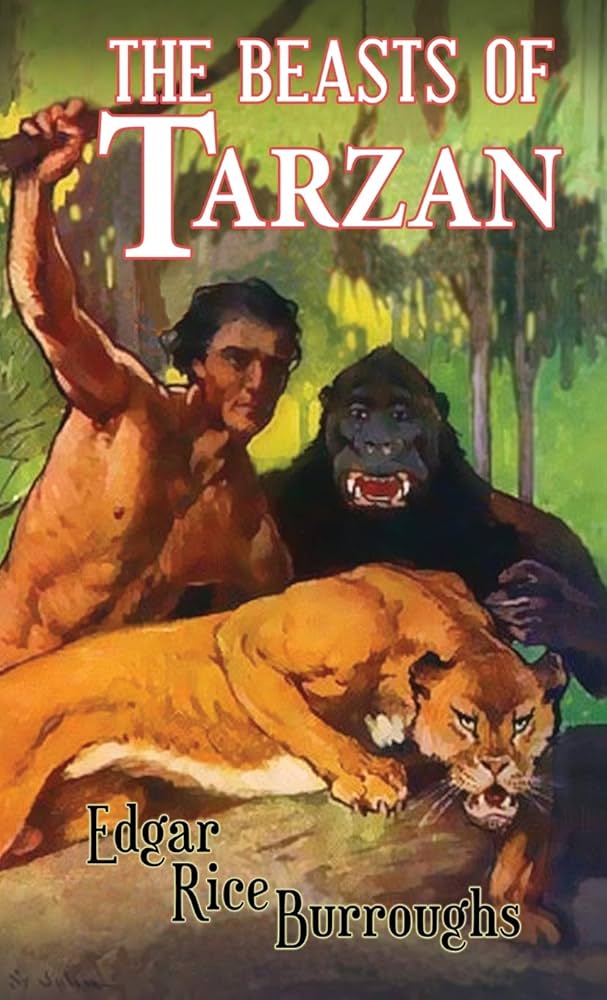Chapter 1 — The beasts of Tarzan
byChapter 1 – The Beasts of Tarzan opens not in the wild, but in the calm of Lieutenant Paul D’Arnot’s apartment in Paris, where a troubling piece of news reignites a deep-seated fear. Tarzan learns that Nikolas Rokoff, long believed imprisoned, has escaped, and with him, all the dangers of the past resurface. Concern floods Tarzan’s mind, not for himself, but for Jane and their son, Jack, whom he had left in London to avoid the rains of Uziri. What began as a peaceful retreat becomes a looming nightmare. Tarzan immediately resolves to return to his family, his instincts warning of the threat that Rokoff now poses. Despite the civility of his current life, his wild intuition remains sharp, sensing danger before it shows its face.
While Tarzan races home, Rokoff plots his revenge in a quiet cottage beyond London’s reach. With his accomplice Alexis Paulvitch, he weaves a cruel scheme involving not just vengeance, but manipulation and profit. Their plan centers on kidnapping Jack, striking where Tarzan is most vulnerable. Disguised as a new servant named Carl, one of their men infiltrates Tarzan’s household. Through a combination of lies and calculated timing, the baby is stolen, taken away in a waiting cab as Jane and the nurse remain unaware until it’s too late. The betrayal stings not just because it’s personal, but because it unfolds under the illusion of safety. When Tarzan receives the message of the kidnapping, there is no hesitation—he must act swiftly, even if it means walking blindly into the unknown.
Jane’s account of the abduction reveals the disturbing precision with which Rokoff executed the plan. Her recounting is calm but heavy with guilt, especially knowing that trust was used against them. Meanwhile, Tarzan is contacted by someone offering details about Jack’s location, in return for protection from the law. Suspicion rises, yet the desperation to find his son outweighs the fear of deceit. He agrees to the meeting in Dover, where every step forward feels like sinking deeper into a trap. Unbeknownst to him, Jane has followed, driven by the same desperation and unwillingness to remain behind. In this moment, the civilized world they’ve built begins to crack.
The trip to Dover takes on the tension of a hunt, though Tarzan is not the hunter. The contact lures him toward a docked steamer, claiming the boy is aboard. As Tarzan follows the directions, something feels wrong—his instincts scream in warning, but the promise of Jack’s safety presses him forward. Too late, he realizes the deception. Overpowered and bound, Tarzan becomes a captive aboard the very vessel that was meant to reunite him with his son. The cage is steel, not vines, but the feeling is familiar. His muscles remember the jungle. His mind, honed by survival, begins planning immediately.
Meanwhile, Jane watches from afar, unseen but unable to intervene. Her decision to follow is brave, though it leaves her stranded without allies. In her heart, she believes that Tarzan will find a way out, as he always has. She returns to London with a renewed resolve, knowing that waiting passively will no longer suffice. Behind the fear is something deeper—an echo of the wild, of the world Tarzan once called home, rising once again to the surface. This situation is not merely about survival; it’s about reclaiming what was stolen. The jungle may be far away, but its rules have returned to their lives.
This opening chapter builds its tension with precision, merging emotional weight with looming conflict. Tarzan’s instincts, once dormant in the polished settings of Paris and London, awaken under pressure. Rokoff, the embodiment of betrayal, has struck a blow that feels almost mythical in cruelty. For the reader, the contrast between civilization and savagery sets the stage. Tarzan must now step back into the primal force that shaped him. With his family threatened, the jungle inside him stirs again—silent, lethal, and waiting. As the ship pulls away from the coast, a new journey begins, one forged in blood, love, and an unbreakable will to reclaim what matters most.

